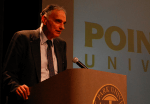
By: Brandon Cooper > Junior > Journalism> University of Maryland, Photo by: Lindsay Dill
Ralph Nader, the long-time third-party presidential candidate, seems to be a man of the people.
Despite the fact that never enough of those people voted him to be their leader, the man has a strong record of advocating for the powerless. Nader has created or been involved with organizations protecting the environment, keeping track of multinational corporations and reforming nursing homes.
He is the ultimate underdog; and that’s why it’s somewhat peculiar that his sports reform group, the League of Fans, is calling for an end to all athletic scholarships.
Nader and his League believe ending these scholarships and only providing need-based aid will put an end to the professional atmosphere that they believe has enveloped collegiate sports for the past few decades.
According to the League of Fans website, “athletes can be students again” if athletic scholarships are eliminated.
Yet, as pure as his intentions are and as helpful as Nader is trying to be, his call to end athletic scholarships focuses too much on revenue sports and, besides, might not end the professionalism in some NCAA Division I athletics.
To begin, Nader’s claim that college athletics being too professional focuses too narrowly on the more popular sports like basketball and football.
Dave Roach, president of the National Association of Collegiate Directors of Athletics (NACDA) and the athletic director at Colgate University, believes the League of Fans is missing out on smaller sports that still have an amateur feel to them.
Sports like gymnastics, skiing and field hockey often provide players with athletic scholarships while still maintaining an amateur feel.
Roach pointed out that many student-athletes on scholarship in these smaller sports pay a great amount of attention to their education and go on to graduate and get jobs dealing with what they learned in school. Yet, when the League of Fans called for eliminating athletic scholarships, they are thrown in to the same category as the larger sports.
“They focus on a few sports, a few institutions and a few specific instances,” Roach said.
Aside from missing the big picture of all the sports in NCAA Division I, the League of Fans belief that ending athletic scholarships would end professionalism in college sports is wrong.
Simply put, removing these would not affect the professional atmosphere because it does not hurt the main aspect contributing to the culture: the financial system. The NCAA and its colleges make too much money to change the way their sports, particularly basketball and football, are run.
Jim Carr, president of the National Association of Intercollegiate Athletics (NAIA), a smaller athletic association similar to the NCAA, agrees with Nader on many of the issues he is standing against, but also sees how powerful the “entertainment model” the NCAA has created can be.
Carr believes the “horse has left the barn” on changing the professionalism of Division I sports and thinks many major football and basketball programs have no interest in doing so because of how successful their system has been.
“The dollars at stake at the division one level are what drive [the NCAA],” Carr said. “That model has been made all the way down. It would be difficult for them to kill the golden goose.”
Ultimately, the reason ending athletic scholarships is not the solution to eliminate the professional atmosphere in college sports, and more specifically basketball and football, is because it does nothing to affect the overarching financial model.
The system in place and the money being made in the NCAA is too gargantuan to allow for a change in focus from athletics to education simply because scholarships are eliminated.
As long as billions of dollars in revenue are being produced thanks to the play of student athletes, it is hard to believe the system will allow them to focus more on something (their education) that creates $0 in revenue.
Roach believes the NCAA is already becoming more and more serious in their effort to motivate students to academic achievement, pointing out the graduation rates that continue to rise in college sports.
However, if Nader and the League of Fans would like to see even more emphasis on education, they are going to have to find some way to change the overall financial system that comes with college sports. Removing athletic scholarships does little to make this change; and it’s the students who are no longer eligible for these scholarships that loose out.
Until Nader is able to find some way to trump the mighty dollar, nothing is going to take away the professionalism he sees.



















